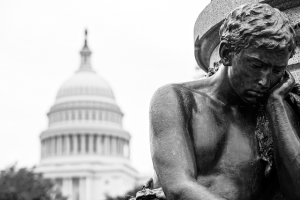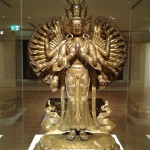 It’s difficult to figure out to respond when a large percentage of our population rallies behind a political candidate who is overtly and proudly prejudiced against numerous groups of people, who eagerly promises to respond to the world with violence, and who rejects rational discourse in favor of yelling more loudly and rudely at his opponents than they do at him. This isn’t a simple matter of opinion anymore. This isn’t about whether you lean more toward trickle-down economics or socialism. This is a scary situation.
It’s difficult to figure out to respond when a large percentage of our population rallies behind a political candidate who is overtly and proudly prejudiced against numerous groups of people, who eagerly promises to respond to the world with violence, and who rejects rational discourse in favor of yelling more loudly and rudely at his opponents than they do at him. This isn’t a simple matter of opinion anymore. This isn’t about whether you lean more toward trickle-down economics or socialism. This is a scary situation.
How do we respond A) as spiritual, moral people, and B) in order to bring our best to the situation, rather than simply making things worse? We all know that anger, judgment, and hatred – as confirming and satisfying those states of mind can be at times – simply create a deeper division between ourselves and those who we would like to convince to act differently. Not to mention that anger, judgment, and hatred eat us up inside, and indulging in them is contrary to every true spiritual or religious teaching! Although something in us tells us we need to arm for a fight, another part of us knows that in the long run aggression is simply going to contribute to the whole problem.
The Buddha said, “Hatred never ends through hatred. By non-hate alone does it end. This is an ancient truth.” (1)
But how do we manifest non-hate while still taking a stand in this world? Because we have to take a stand. Non-hate isn’t the only essential aspect of the spiritual and moral life. There’s also wisdom and compassion. If we watch suffering, injustice, and greed with a spirit of resignation (there’s nothing I can do, the world’s just a terrible place), or if we avoid witnessing problems by numbing out, we are no good to others and we damage our own hearts and minds. So – if we refrain from indulging anger, judgement, and hatred and we refuse to sink into resignation, what do we do?
This is where the Buddha’s “Middle Way” comes in. Just as Buddhist spiritual practice was very carefully designed to be the “middle way” between self-indulgence and asceticism (strict self-denial), we are encouraged to look for the middle way in all of our affairs. In the case of politics, it is useful to rephrase the “Middle Way” as the “Third position,” because the middle way is not a bland compromise between two extremes. It’s not half of one thing and half of another. It’s not avoiding engagement by straddling the fence.
Caught up in discriminatory thinking, we can only see option “A” and option “B.” (Especially when we’re being egged on by divisive and sensationalist political voices.) The Third Position can be found in every situation when we refuse to get trapped in either extreme; it’s describes our experience when we realize having to choose between option “A” and option “B” is a manufactured fallacy. We choose something else entirely.
The Third Position in the political sphere is an incredibly powerful and stable position. To find it, we look within and reconnect with our deepest values. For a moment, we let go of the details of this or that political candidate or piece of legislation. We remember to do unto our neighbors as we would have them do unto us. We remember Christ’s injunction to care for the poorest of his brethren as we would care for Him. We remember that a life lived without generosity and compassion as barren and sad. We remember how our hearts hurt when we see images of people experiencing acute suffering and injustice all over the world. We remember how obvious it was to us as children that everyone was just a human being, regardless of their religion, nationality, or the color of their skin.
Then, once we’ve reconnected with values we hold so dear we would be willing to risk our very lives to uphold them, we balance that with realistic acceptance of the way the world really is. In Buddhism we observe that all the ills of the world spring from three fundamental poisons: greed, hate, and delusion. When we are greedy, we put ourselves before others and try to attain pleasure, happiness, and security through non-spiritual means and at any cost. When we are hateful, we indulge anger and fear, seeking to protect ourselves. When we are caught in delusion we are consumed by self-concern, forget about compassion, and go about seeking satisfaction in ways that cause great harm to living beings.
Another Buddhist teaching is that all beings are simply trying to avoid pain and seek happiness. Because of the three poisons, we often do this in ways that actually increase pain and decrease happiness for ourselves and/or others, either in the short term or the long term. For example, in the short term I may gain security and pleasure from a system that exploits certain segments of our population and destroys the environment. In the long term, however, I do not exist as an island. I am interconnected with everything and everyone; my life depends on social and natural systems. In addition to the spiritual damage I do to myself by acting with greed, hate, and delusion, eventually my security and pleasure will be threatened by social unrest and environmental degradation. All along, I was just trying to be happy – but not in ways that were ultimately effective.
When we look at the world from the Third Position, we see it more objectively. We see it’s simultaneously a wonderful and f–ked-up place. What else did we expect? If you represent the approximately 240,000-years of our species, Homo sapiens, as one 24-hour period, we only discover the wheel by 11:20pm, and the industrial revolution begins at 11:58pm. (2) Why do we expect human society to be just, peaceful, and sustainable when we had slavery in America only 150 years ago (about six generations), and the atrocities of the holocaust happened less than 75 years ago? Sure, we’ve learned a great deal – but it’s naive to think we’ve outgrown greed, hate, and delusion in a matter of decades.
Still, it’s important to have a realistic view without succumbing to despair or resignation. Our deeply held values and the often-sorry state of the world do not have to exist in opposition to each other. Such opposition is option “A” and we’re taking the Third Position. In the Third Position we naturally feel sadness and regret when we witness greed, hate, and delusion and the suffering they cause. We naturally wish it was otherwise. But then we touch base with things-as-they-are right here, right now. I am breathing. I want to help. I will point out greed, hate, and delusion when I see them. If the situation calls for it, I will do whatever I can to promote love, justice, peace, and a sane relationship with the natural world. There is the state of the world, and there are my values, and my love, and the love of others, and my hope. Everything just is. We are capable of being authentically present with it all – and when we are, our hearts can be at peace even as we prepare to act on our values.
When I see Donald Trump I feel great pity for him. He is firmly in the grip of greed, hate, and delusion. While he is responsible for his actions, in a certain sense he knows not what he does. His followers are similarly overwhelmed by the three poisons. Some are rich, feel they deserve it, and see themselves as safely removed from the misfortunes of others. Some are poor and disempowered, and are eager to identify vulnerable scapegoats for their situation (at least they’ll get the temporary satisfaction of enacting anger and hatred in order to see others suffer like they do). I’m sure there are other motivations for supporting Trump, but it seems like a great many of them spring from greed, hate, and delusion.
Still, it’s important to remember that even beings overcome by greed, hate, and delusion are just beings. They are simply trying to avoid pain and seek happiness, in however deluded and harmful a fashion. When you think about it, such a situation is much less scary – and much more manageable – than one where fundamentally selfish, inhuman, or even evil people are responsible for the world’s ills. If the latter were the case, there would not be much hope for change.
It’s not easy to remain in the Third Position. We often get pulled toward either extreme – toward anger and aggression, or toward numbing out and resignation. To avoid getting caught, we have to stay mindful and willing.
(1)Fronsdal, Gil (translator). The Dhammapada: A New Translation of the Buddhist Classic with Annotations (p. 2). Shambhala Publications. Kindle Edition. (2012-02-03) (2)Macy, Joanna and Chris Johnstone. Active Hope: How to Face the Mess We're in without Going Crazy. New World Library: Novato, CA. 2012.












